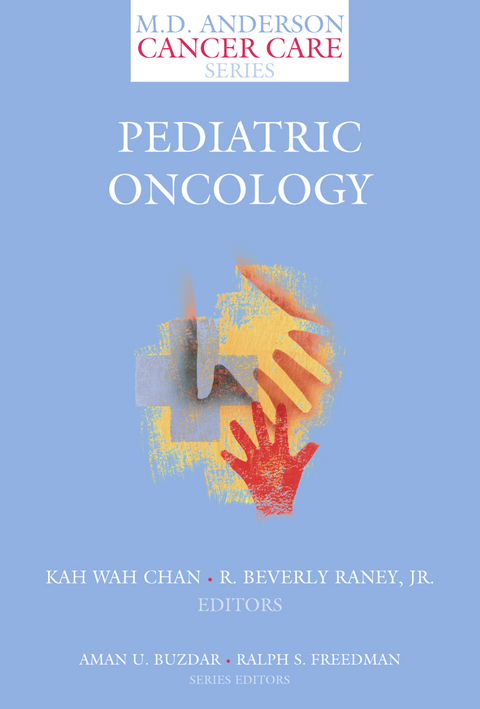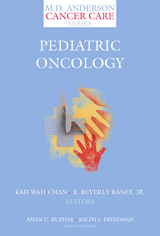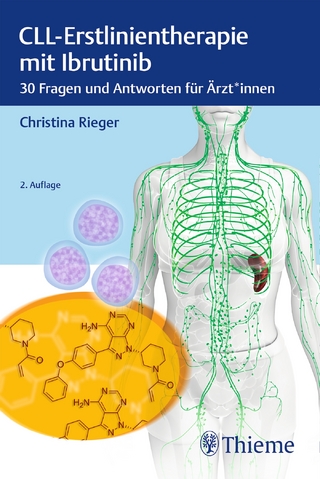Pediatric Oncology
Seiten
2005
Springer-Verlag New York Inc.
978-0-387-24470-9 (ISBN)
Springer-Verlag New York Inc.
978-0-387-24470-9 (ISBN)
Childhood cancer was almost always fatal before 1970. Despite the fact that pediatric cancers account for only a small p- centage of the total cancer burden, more effective therapies are needed to improve mortality rates in children. Anderson Cancer Center has been caring for children with c- cer since its doors opened over 60 years ago.
Childhood cancer was almost always fatal before 1970. Today, 80% of ch- dren diagnosed with cancer will survive at least 5 years; 70% will be cured. However, cancer continues to be the leading cause of nonaccident-related deaths in children. More children die each year from cancer than from c- tic ?brosis, diabetes, asthma, AIDS, and congenital abnormalities combined. Nine children die from cancer every school day. Despite the fact that pediatric cancers account for only a small p- centage of the total cancer burden, more effective therapies are needed to improve mortality rates in children. Therefore, our research priority must be the development of new agents and new therapies for childhood cancer. M. D. Anderson Cancer Center has been caring for children with c- cer since its doors opened over 60 years ago. This institution has been home to several research and clinical pioneers whose innovative work has in?uenced and shaped the practice of pediatric oncology throughout the world. Notably, Drs. Wataru W. Sutow, Donald Pinkel, and Norman Jaffe have been credited with introducing curative therapies for children with leukemia and solid tumors. Cancer treatment involves far more than administering chemoth- apy and surgically excising tumors. It requires a multidisciplinary - proach to patient management, particularly in the treatment of solid - mors, which pose the biggest challenge in cancer care today. Surgery and radiotherapy as well as radiographic and pathologic assessments of response are critical factors in the treatment of children with cancer.
Childhood cancer was almost always fatal before 1970. Today, 80% of ch- dren diagnosed with cancer will survive at least 5 years; 70% will be cured. However, cancer continues to be the leading cause of nonaccident-related deaths in children. More children die each year from cancer than from c- tic ?brosis, diabetes, asthma, AIDS, and congenital abnormalities combined. Nine children die from cancer every school day. Despite the fact that pediatric cancers account for only a small p- centage of the total cancer burden, more effective therapies are needed to improve mortality rates in children. Therefore, our research priority must be the development of new agents and new therapies for childhood cancer. M. D. Anderson Cancer Center has been caring for children with c- cer since its doors opened over 60 years ago. This institution has been home to several research and clinical pioneers whose innovative work has in?uenced and shaped the practice of pediatric oncology throughout the world. Notably, Drs. Wataru W. Sutow, Donald Pinkel, and Norman Jaffe have been credited with introducing curative therapies for children with leukemia and solid tumors. Cancer treatment involves far more than administering chemoth- apy and surgically excising tumors. It requires a multidisciplinary - proach to patient management, particularly in the treatment of solid - mors, which pose the biggest challenge in cancer care today. Surgery and radiotherapy as well as radiographic and pathologic assessments of response are critical factors in the treatment of children with cancer.
Acute Leukemia.- Hodgkin Lymphoma and Non-Hodgkin Lymphoma.- Brain Tumors: Diagnosis, Surgery and Radiotherapy, and Supportive Care.- Brain Tumors: Chemotherapy and Investigational Therapy.- Wilms’ Tumor.- Neuroblastoma.- Soft-Tissue Tumors.- Osteosarcoma.- Ewing’s Sarcoma.- Retinoblastoma.- Differentiated Thyroid Cancer.- Medullary Thyroid Carcinoma.- Melanoma.- Novel Therapeutic Approaches.- Supportive Care: Myelosuppression.- Supportive Care: Symptom Control.- Behavioral Medicine in Cancer Care.- The Adolescent and Young Adult Program.
| Reihe/Serie | MD Anderson Cancer Care Series ; 4 |
|---|---|
| Zusatzinfo | XVI, 288 p. |
| Verlagsort | New York, NY |
| Sprache | englisch |
| Maße | 155 x 235 mm |
| Themenwelt | Medizin / Pharmazie ► Medizinische Fachgebiete ► Onkologie |
| Medizin / Pharmazie ► Medizinische Fachgebiete ► Pädiatrie | |
| ISBN-10 | 0-387-24470-0 / 0387244700 |
| ISBN-13 | 978-0-387-24470-9 / 9780387244709 |
| Zustand | Neuware |
| Informationen gemäß Produktsicherheitsverordnung (GPSR) | |
| Haben Sie eine Frage zum Produkt? |
Mehr entdecken
aus dem Bereich
aus dem Bereich
Korrigierter Nachdruck 2020 mit allen Ergänzungen der UICC aus den …
Buch | Softcover (2020)
Wiley-VCH (Verlag)
CHF 59,95
30 Fragen und Antworten für Ärzt*innen
Buch | Softcover (2023)
Thieme (Verlag)
CHF 6,95




